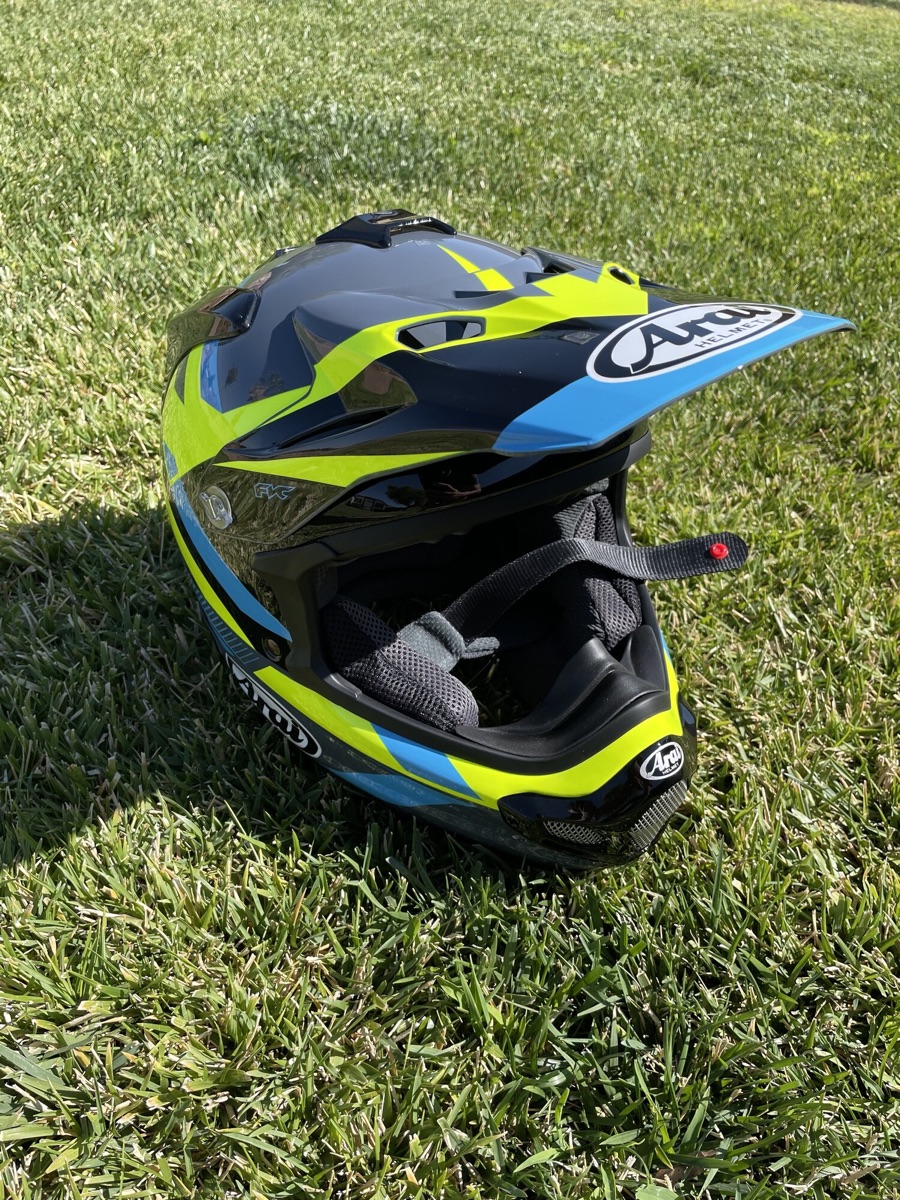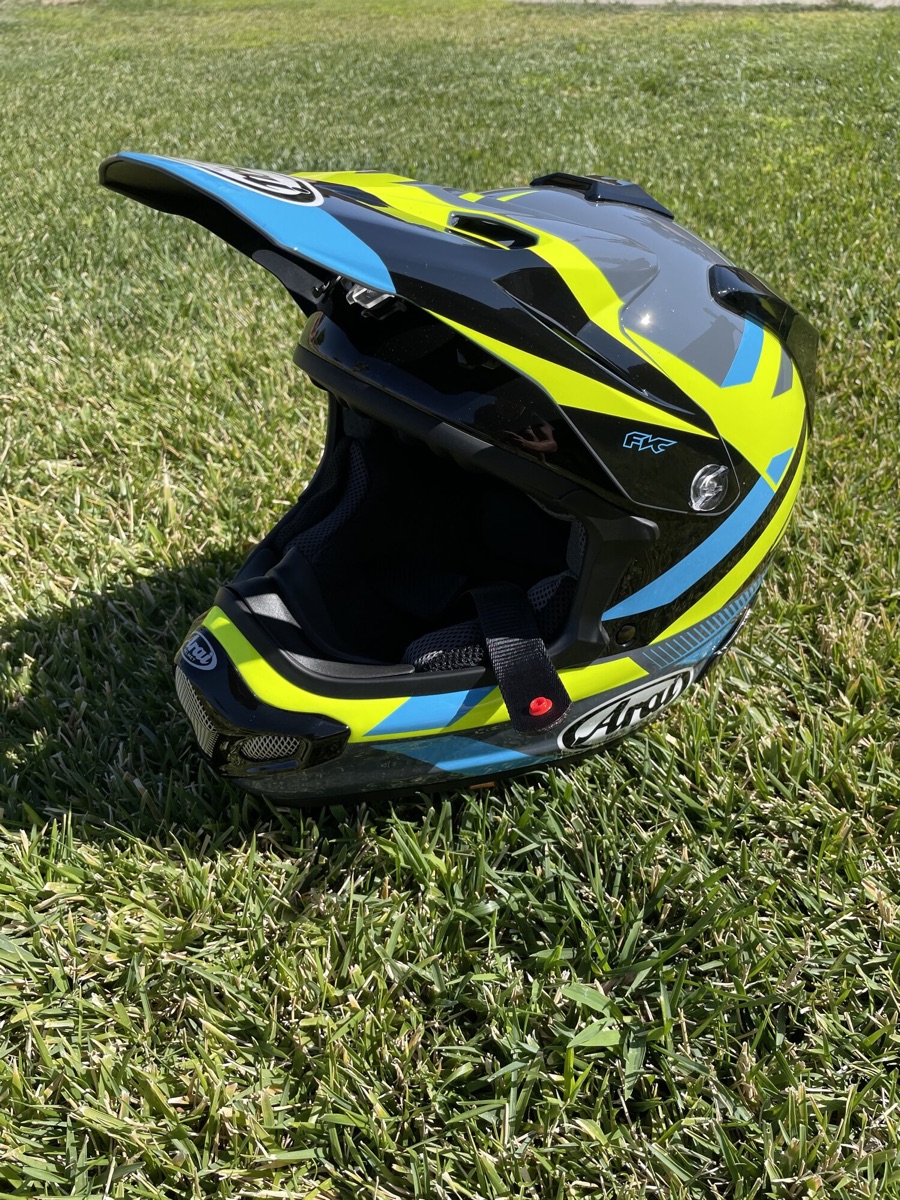Share This Article
The VX-Pro4 has been in my helmet test rotation for a while now and that time has given me some hard opinions on the crash lid. The overall look and function of the Pro4 is similar to the older model, but with a few new features that further refine Arai’s helmet fitment, which more of a round shape. There are several cool new colorways that pop up from time to time and I personally like bright helmets, so this particular “Machine” color is my favorite that is available now.

Starting with the basics of the Arai lid, the visor is long and wide enough to provide better protection from other riders roost. The visor comes with a black sticker on the underside to reduce glare and has large air vents for an ample amount of ventilation. Rather than Arai drilling more or larger holes in the shell, the venting pieces on the top and back of the helmet have been designed to be more efficient at moving air through the helmet. On the older Arai’s I had a problem with the front of the helmet being too close to my big nose, but Arai has since moved the grill and mouth vents to the front of the bar, creating more space in front of my face. The cheek pad design hinges out of the way when taking on or off the helmet, yet is supportive and secure while riding. As with all Arai helmets, the Pro4 features a multi-density foam that Arai claims, in conjunction with the helmet’s stiff shell, provides better protection in a wide variety of crashes.
When I first slipped on the medium sized helmet, I noticed how much material was making contact with my face/head. The cheek pads are long and tall and extend well past the bottom edge of the shell which I really like. Combined with the padding around the rear of the helmet, the VX-Pro4 has a very “round head”’ feel, unlike other helmets that can feel more on top of the head. I have a round shaped head so this type of shell makes it one of the most comfortable lids to wear on longer test days. The pillow like feel of the liner is by far my favorite and if there is a standard for comfort the Arai VX-Pro4 helmets are close to the top for me. The ERS (Emergency Release System) cheek pads have a snug feel to it and wraps around my cheeks with a snugger fit, but if you do have a fat face then Arai offers optional cheek pads to snap in. This is a great option for you guys that don’t like cheek pads touching your cheeks as much. At $749.95 this is one of the higher priced helmets, but the comfort you get from the Arai is well worth the price marker.
Ventilation is not the VX-Pro4’s strong point compared to some other models like the 6D, Fly Formula or even a Bell Moto 10. Like I mentioned earlier, it’s “ok” but in the hot summer months of California I was sweating more with the Arai than others. Arai’s primary goal of having the strongest shell makes for very few vent holes. The lack of ventilation is pronounced by the amount of very comfortable foam lining. The relief zones for your ears are pretty small and I felt more material in that area than with other helmets (hence the comfort). This makes the Arai a very quiet helmet inside while riding compared to a louder 6D, but the 6D breathes better for me. The goggle port is on the small side and to accommodate larger goggles like my favorite pair of Oakley Airbrake’s or goggles with nose guards, it’s tough to get them situated inside the port creating a good seal. I removed the rubber nose protector immediately on the VX-Pro4 to get extra room for goggles.

Don’t be scared to throw the liner in the washing machine as the liner can withstand the abuse of the washer just don’t throw it in the dryer. Let the liner air dry and you will be just fine. With the VX-Pro4, there is a balancing act with safety and comfort. After watching a bigger man stand on the empty shell of a Pro4 without it flexing much at all, I got a good taste of how strong and hard this shell is (similar to a SHOEI VFX-W). Maybe this is some of the older tech that is being used by Arai, compared to the newer tech that 6D, Fly or Bell have been putting out. Plus, with Arai’s triple density foam and breakaway visor and vent pieces, I have little doubt that the helmet would perform very well in a high speed crash. However, since it isn’t the lightest or most ventilated helmet on the market, you have to decide for yourself where you fall in the wide spectrum of helmet comfort and performance. I personally love the comfort so it’s one of my top three helmets to ride with, but with further advancements in helmet tech as of late, Arai may need to latch onto some newer safety features soon.
You can check them out at araiamericas.com and see all the designs they have available. If you have any questions feel free to email me at kris@keeferinctesting.com.
